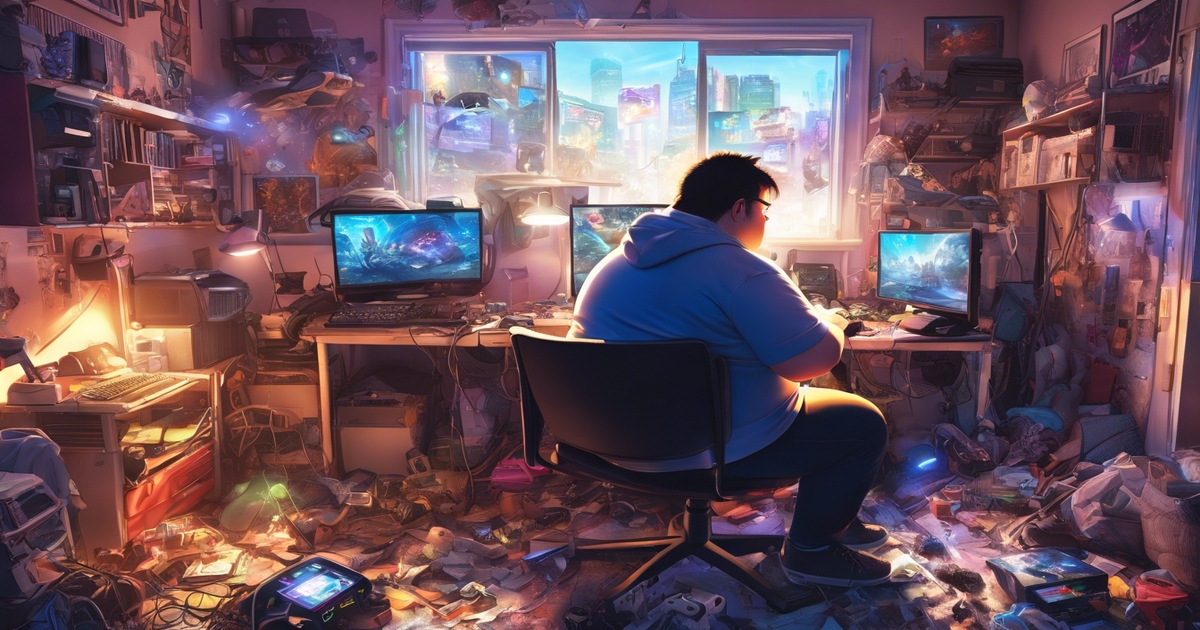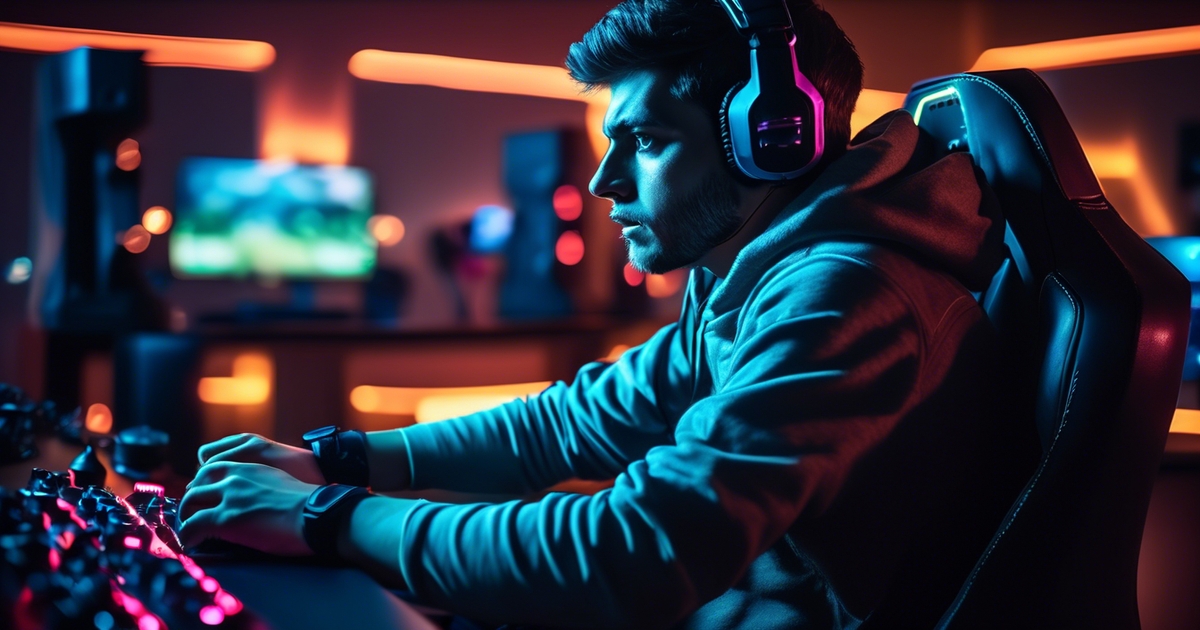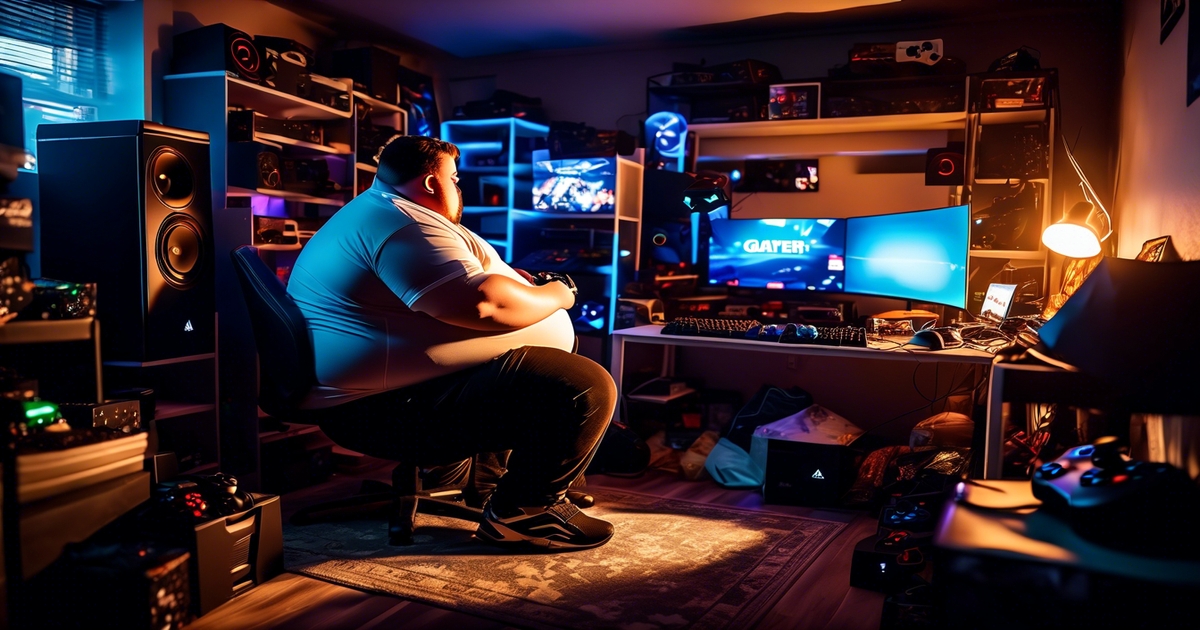Should I Stop Gaming? Why It’s Time To Quit

- Key Takeaways
- Understanding the Time-Wasting Nature of Games
- The All-Consuming Nature of Gaming and Its Impact
- Recognizing Excessive Gaming Habits
- Benefits of Quitting Games for Mental and Emotional Well-being
- Strategies for Managing Gaming Time Effectively
- Finding Better Alternatives to Gaming
- Overcoming Challenges Faced When Quitting Games
- Personal Reflections on the Journey to Quit Gaming
- Conclusion: Embracing a Life Beyond Gaming
- Frequently Asked Questions
Curious about the impact of gaming on your daily life? It’s time to evaluate those gaming habits. Quitting might just be the key to a better lifestyle. Running through reasons, excuses, and information can shed light on whether it’s time to part ways with gaming this year. Understanding why you game and what you gain from it is essential in making this decision. So, are you ready to explore the possibility of quitting gaming for a more fulfilling existence?
Key Takeaways
- Recognize the time-wasting nature of excessive gaming and its impact on mental and emotional well-being.
- Understand the all-consuming nature of gaming and the need to manage gaming time effectively.
- Acknowledge excessive gaming habits and take actionable steps to find better alternatives for personal growth and development.
- Embrace the benefits of quitting games for mental and emotional well-being, and overcome challenges faced when quitting games.
- Reflect on personal experiences and consider strategies for managing gaming time effectively to embrace a life beyond gaming.
- Find better alternatives to gaming that contribute to personal growth and well-being.
Understanding the Time-Wasting Nature of Games

Highlighting Addictive Nature
Video games can be addictive, often leading to excessive playing and neglect of other important activities. The interactive and immersive nature of games can make it hard for players to stop, causing them to spend hours at a time gaming.
Games are designed to be engaging, with rewards and achievements that keep players hooked. This leads to individuals spending countless hours on gaming, sometimes even losing track of time.
The addictive nature of gaming can have detrimental effects on an individual’s life, leading to decreased productivity in work or school. For example, someone might find themselves spending entire days immersed in a game instead of completing essential tasks or responsibilities.
Consuming Excessive Time
Gaming can waste an excessive amount of time if not managed properly. Players may start off intending to play for a short while but end up getting engrossed for much longer than planned.
For instance, what was meant as a quick 30-minute session could easily turn into several hours without the player realizing it. This loss of time due to gaming can impact various aspects of life such as relationships, academic performance, and personal development.
Some individuals may find themselves sacrificing years pursuing virtual achievements rather than focusing on real-life goals and aspirations. This overindulgence in gaming can lead to missed opportunities and hinder personal growth over extended periods.
Impact on Productivity
The impact of excessive gaming on productivity is significant. When individuals spend too much time playing video games, they often neglect their duties and obligations in other areas of life.
This lack of balance between leisure activities like gaming and essential tasks like work or studies results in poor time management skills. As a result, responsibilities get neglected while precious days are spent fixated on screens instead.
The All-Consuming Nature of Gaming and Its Impact
Immersive Experience
Modern video games are designed to be immersive, captivating players for hours on end. With stunning graphics, compelling storylines, and challenging gameplay, it’s easy to get lost in the virtual world. For example, open-world games like “The Legend of Zelda: Breath of the Wild” offer vast landscapes to explore and numerous side quests to complete, making it hard for gamers to put down their controllers.
Gaming can become a full-time commitment, leaving little room for other activities. Whether it’s multiplayer online battle arenas (MOBAs) like “League of Legends” or massively multiplayer online role-playing games (MMORPGs) like “World of Warcraft,” these titles demand continuous attention and dedication from players.
Impact on Social Interactions
The allure of gaming can lead to a decline in real-life social interactions. Spending countless hours immersed in virtual worlds means less time connecting with friends and family face-to-face. Gamers may opt for online communication over in-person conversations, missing out on meaningful moments with loved ones.
Moreover, excessive gaming can hinder the development of crucial social skills. Instead of engaging in group activities or team sports that promote cooperation and camaraderie, some individuals may prefer solitary gaming sessions at home. This could potentially lead to feelings of isolation and detachment from their immediate communities.
Neglecting Responsibilities
One significant concern surrounding gaming is its potential negative impact on personal responsibilities. When engrossed in a game, individuals may neglect essential tasks such as school assignments or work deadlines. For instance, someone engrossed in playing “Fortnite” might lose track of time and end up sacrificing much-needed sleep before an important exam or presentation.
Furthermore, maintaining a healthy balance between leisure activities like gaming and daily obligations is crucial but often overlooked by avid gamers. This imbalance could result in adverse effects on one’s overall well-being due to neglecting physical health needs or failing to meet academic or professional commitments.

Recognizing Excessive Gaming Habits
Identifying Signs
Excessive gaming can lead to neglecting responsibilities, decreased social interaction, and disrupted sleep patterns. Help from friends or family may be needed if gaming starts interfering with daily life.
When gaming becomes the sole focus, it’s essential to recognize the signs of addiction: irritability when not playing, neglecting personal hygiene, and loss of interest in other activities. These are all indicators that one should consider whether they should i stop gaming.
Psychological Effects
The psychological effects of excessive gaming can include increased aggression, poor academic performance, and social isolation. It’s important to acknowledge these impacts on mental health and seek support if necessary.
Gaming addiction shares similarities with other addictive behaviors such as alcoholism. Both can lead to negative consequences in various aspects of life. Understanding this parallel helps individuals realize when their gaming habits have become problematic.
Priority Over Other Activities
Recognizing when gaming takes precedence over other activities is crucial. If it becomes a priority over school or work obligations, relationships, or physical health, then it may be time to reevaluate one’s relationship with gaming.
Benefits of Quitting Games for Mental and Emotional Well-being
Improved Mental Health
Quitting gaming can have a positive impact on your mental health. When you spend excessive time playing games, it often leads to neglecting other important aspects of life such as schoolwork, relationships, or personal development. By redirecting that energy and time towards more balanced activities, you give yourself the opportunity to improve your overall mental well-being. Instead of feeling stressed about unfinished responsibilities or isolated due to excessive screen time, quitting gaming allows you to engage in activities that promote a healthier mindset.
For example:
- Engaging in physical exercise can release endorphins which are natural mood lifters.
- Pursuing hobbies like painting or writing can provide an outlet for self-expression and creativity.

Enhanced Emotional Well-being
After quitting games, individuals often experience improvements in their emotional well-being. The constant stimulation from gaming can lead to heightened levels of stress and anxiety. However, by stepping away from this intense virtual world and engaging with real-life experiences instead, individuals may find themselves feeling calmer and more at peace.
Furthermore:
- Spending quality time with friends and family members fosters a sense of belonging.
- Exploring nature or taking up mindfulness practices helps reduce feelings of tension and restlessness.
Reduced Stress Levels
One significant benefit of stopping gaming is the potential for reduced stress levels. Constantly striving for achievements within games creates a cycle where failure brings frustration while success brings temporary relief followed by the desire for even greater accomplishments. This cycle contributes significantly to increased stress levels over time.
Moreover:
- Redirecting focus towards personal growth endeavors provides a sense of fulfillment without the pressure associated with competitive gaming.
- Engaging in relaxation techniques such as deep breathing exercises aids in lowering stress hormones within the body.
Strategies for Managing Gaming Time Effectively
Setting Boundaries
Setting boundaries is crucial. It’s important to establish clear limits on how much time you spend playing games each day. For example, you could decide to only play for an hour after completing your homework or chores. This helps prevent excessive gaming and ensures that other important activities are not neglected.
It’s also beneficial to communicate these boundaries with family members or roommates so they can help hold you accountable. By doing this, they can support your efforts in regulating your gaming habits and remind you when it’s time to take a break from playing.
Creating a Schedule
Creating a schedule for gaming sessions can be incredibly helpful in maintaining balance between gaming and other activities. Allocate specific times during the week for gaming, making sure that it doesn’t interfere with schoolwork, exercise, socializing, or other responsibilities.
For instance, you might designate weekends as the primary time for longer gaming sessions while dedicating weekdays to more structured activities like studying and extracurriculars. Having a schedule not only prevents excessive gameplay but also allows you to enjoy gaming without feeling guilty about neglecting other aspects of your life.
Balancing Gaming with Other Activities
Balancing gaming with other activities is essential for overall well-being. It’s important to engage in physical exercise, social interactions, hobbies, and educational pursuits alongside gaming. For example, if you love playing soccer or painting, make sure there’s dedicated time in your schedule for those activities too.
Finding Better Alternatives to Gaming
Exploring New Activities
When considering whether you should stop gaming, it’s essential to explore new activities that can replace the time spent playing games. Engaging in a new hobby or pursuing different forms of play can provide a refreshing change from gaming. For example, taking up photography, learning an instrument, or trying out a new sport are all excellent alternatives to spending hours on end playing games.

Exploring these new activities not only opens up opportunities for personal growth and skill development but also allows individuals to discover fulfilling pastimes outside of gaming. By redirecting your focus towards productive and enriching hobbies, you have the chance to expand your horizons and gain valuable experiences that may not be accessible through gaming alone.
Benefits of Exploring New Interests
Dedicating time and effort into exploring alternative activities comes with various benefits beyond simply stepping away from gaming. Engaging in different hobbies or work exposes individuals to diverse skills and interests that could potentially lead to future opportunities. For instance, learning how to play an instrument not only provides enjoyment but also enhances cognitive abilities such as memory retention and multitasking skills.
Moreover, by investing time in other pursuits outside of gaming, individuals may find themselves developing valuable life skills such as discipline, patience, and creativity. These qualities are transferable across various aspects of life including education, career endeavors, and personal relationships.
Overcoming Challenges Faced When Quitting Games
Addressing Withdrawal Symptoms
When you decide to stop gaming, you might experience withdrawal symptoms. These can include irritability, restlessness, and difficulty concentrating. It’s important to acknowledge these feelings and understand that they are a natural part of the process. Try engaging in physical activities or hobbies as a way to distract yourself from these symptoms. For example, taking up painting, going for walks, or practicing a musical instrument can help occupy your mind during this transition.
It’s also helpful to establish a support system of friends or family members who understand your decision and can offer encouragement when you’re feeling overwhelmed by the withdrawal symptoms. Having someone to talk to about your struggles can make the process much more manageable.
Strategies for Dealing with Cravings
It’s essential to find healthy alternatives that provide similar levels of enjoyment. Engaging in physical exercise releases endorphins which can replicate the pleasure experienced during gaming sessions. Finding new hobbies or interests such as reading books, cooking new recipes, or learning a new skill like photography can divert your attention away from cravings.
Creating a schedule for daily activities is another effective strategy. By filling your day with various tasks and responsibilities, there will be less time available for thoughts about gaming. This structured approach helps in breaking the habit loop associated with playing games excessively.
Coping with Social Pressures
Social pressures related to gaming habits may arise when considering quitting games; however it’s crucial not succumb under pressure from peers who encourage excessive gameplay despite knowing its negative impacts on one’s life quality. One way of coping is by openly communicating about your decision with friends and family members so they understand why reducing game time is important for you. Another strategy involves seeking out alternative social activities where video games aren’t involved – joining clubs or groups focused on other interests such as sports teams or art classes provides an avenue for making new connections while avoiding tempting situations.
Personal Reflections on the Journey to Quit Gaming
Positive Changes
Reflecting on whether I should stop gaming has been a transformative journey. After making the decision to quit excessive gaming, I experienced numerous positive changes in my life. I found that I had more time to focus on activities that brought me fulfillment and joy. Instead of spending hours in front of a screen, I began engaging in outdoor activities, reading books, and pursuing hobbies that added value to my life.
The cessation of excessive gaming also led to improvements in my mental and emotional well-being. Without the constant immersion in virtual worlds, I became more present in my daily life. My relationships with family and friends strengthened as I was able to invest more time and energy into nurturing these connections. Quitting gaming allowed me to develop better sleep patterns, leading to increased energy levels during the day.
Personal Growth
Quitting gaming has been pivotal for my personal growth. It prompted me to explore new interests and skills that I hadn’t previously considered. As an alternative to gaming, I started learning how to play a musical instrument and discovered a passion for creating music. This not only broadened my horizons but also boosted my confidence as I delved into uncharted territories.
Moreover, ceasing excessive gaming provided me with the opportunity to set ambitious goals outside of the virtual realm. Whether it was pursuing higher education or excelling in professional endeavors, quitting gaming gave me the clarity and determination needed for success.
Conclusion: Embracing a Life Beyond Gaming
You’ve journeyed through the all-consuming nature of gaming, recognized its impact, and explored the benefits of quitting for your mental and emotional well-being. Now, it’s time to take the leap and embrace a life beyond gaming. By implementing effective time management strategies and finding better alternatives, you can reclaim your time and focus on activities that nourish your soul. Overcoming the challenges won’t be easy, but with determination and support, you can pave a new path filled with personal growth and fulfillment.
It’s your turn to rewrite the narrative of your life. Start by setting small goals, seeking out new hobbies, and connecting with like-minded individuals. Remember, this journey is about progress, not perfection. Embrace the uncertainty, stay resilient, and savor the moments of triumph along the way. You’ve got this!
Frequently Asked Questions
Should I stop gaming if it’s consuming too much of my time?
If gaming is taking up a significant portion of your day, affecting your responsibilities and well-being, it might be time to reevaluate. Consider the impact on your life and whether you’re neglecting other important aspects. It’s crucial to find a healthy balance.
Is excessive gaming harmful to mental health?
Excessive gaming can have negative effects on mental health, leading to increased stress, anxiety, and even depression in some cases. It’s essential to recognize when gaming becomes detrimental to your overall well-being and take steps to address it.
What are some strategies for managing gaming time effectively?
Setting specific limits on gaming time, finding alternative activities that bring fulfillment, and creating a schedule that includes diverse interests can help manage gaming habits effectively. By prioritizing other areas of life alongside gaming, you can achieve a healthier balance.
How do I overcome the challenges of quitting games?
Quitting games may present challenges such as withdrawal symptoms or feelings of missing out. Building a support system, engaging in new hobbies or activities, and staying focused on the benefits of quitting can help navigate these obstacles successfully.
Can quitting games lead to positive changes in life?
Quitting games can lead to improved mental clarity, better emotional well-being, enhanced productivity in various areas of life due to regained time and focus. Embracing new experiences beyond the confines of gaming can open doors to personal growth and fulfillment.
